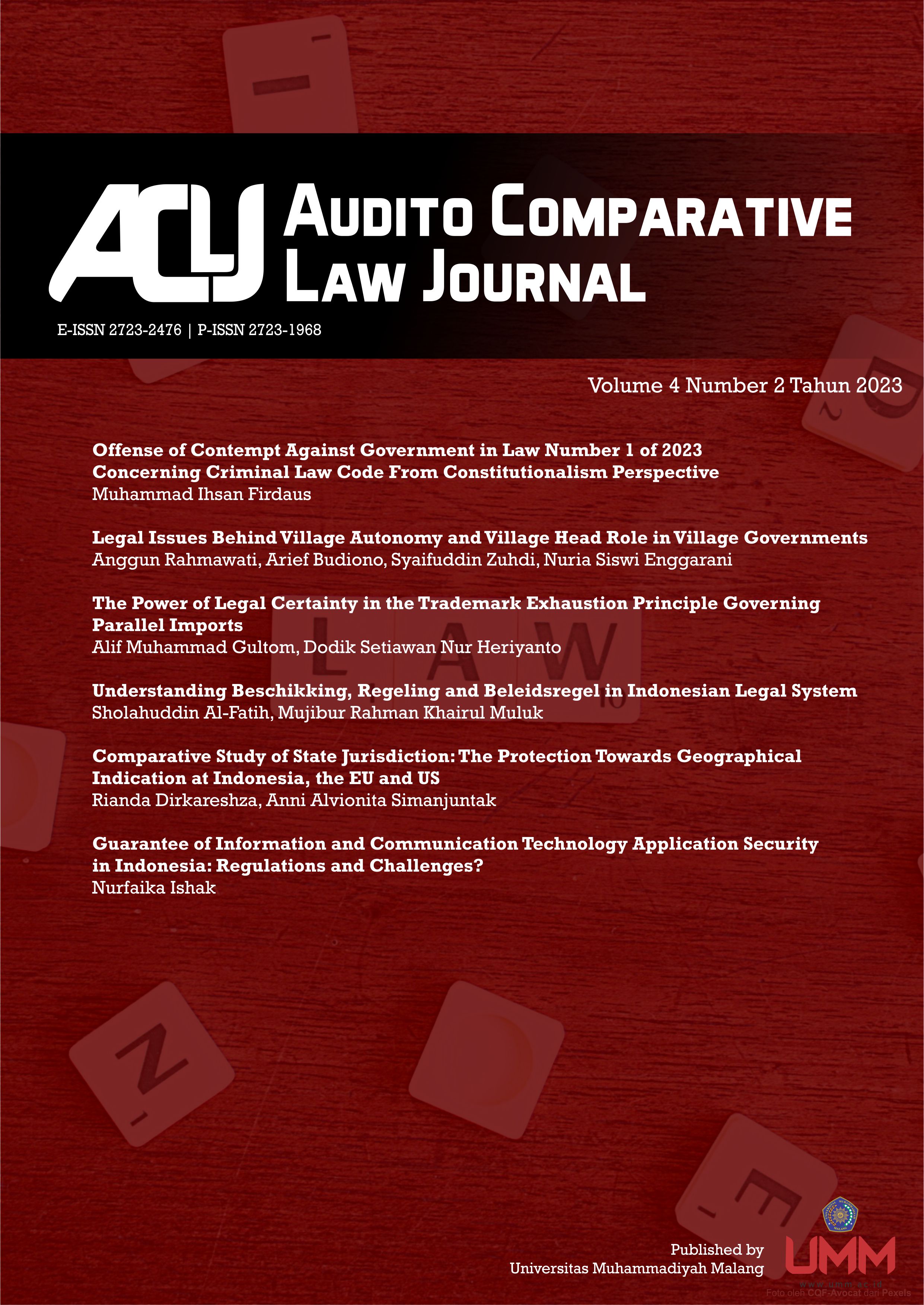Offense of Contempt Against Government in Law Number 1 of 2023 Concerning Criminal Law Code From Constitutionalism Perspective
DOI:
https://doi.org/10.22219/aclj.v4i2.24812Keywords:
offense, contempt against goverment, criminal law code, constitutionalismAbstract
The reform of criminal law in Indonesia has gone through a long process so it came to the enactment and promulgation of Act number 1 of 2023 concerning the Criminal Law Code which revokes the colonial heritage Criminal Law Code. However, as a newly legal product, of course, there are legal issues in it, which is related to the offence of contempt against the government which includes executive, legislative and judicial powers. Specifically for contempt against the President and Vice President, a judicial review has been submitted to the Constitutional Court and ruled unconstitutional, but it has been re-enacted in the Criminal Law Code. So, based on this premise, this research analyzes how the offence of contempt against the government is in Act number 1 of 2023 concerning the Criminal Law Code and whether the offence of contempt against the government is contrary to the principles of constitutionalism. This study uses legal research methods. So, the results of this research are first, that the offence of contempt against the government is contained in Articles 218-220 concerning attacks on honour or dignity and humiliation of the government and or state institutions which are regulated in Articles 240 and 241. Second, these offences are contrary to the principle of constitutionalism which states that power must be limited so that the recognition, respect, and protection of human rights can be properly manifested. So that the state should not regulate the offence, moreover the offence related to contempt of the President and Vice President has been adjudication unconstitutional by the Constitutional Court.
Downloads
References
Abustan, A. (2022). Implementasi Demokrasi dan Legitimasi Penjabat Kepala Daerah di Indonesia. Indonesia Law Reform Journal, 2(3), 274–287. https://doi.org/10.22219/ilrej.v2i3.22202
Alfauzi, R., & Effendi, O. (2020). PEMBATASAN KEKUASAAN BERDASARKAN PAHAM KONSTITUSIONALISME DI NEGARA DEMOKRASI. Politica: Jurnal Hukum Tata Negara Dan Politik Islam, 7(2), 111–133. https://doi.org/10.32505/politica.v7i2.1990
Amrunsyah, A. (2017). TAJAM KE BAWAH TUMPUL KE ATAS. Legalite : Jurnal Perundang Undangan Dan Hukum Pidana Islam, 2(I), 50–72. https://doi.org/10.32505/legalite.v2iI.294
Anjari, W. (2018). EKSISTENSI DELIK ADAT DAN IMPLEMENTASI ASAS LEGALITAS HUKUM PIDANA MATERIIL INDONESIA. Masalah-Masalah Hukum, 46(4), 328. https://doi.org/10.14710/mmh.46.4.2017.328-335
Anugrah Pradana, S., Sudirman, R., & Alvian, M. A. (2022). Kemelitan Penegakan Hukum terhadap Hak Kebebasan Berpendapat. DIKTUM: Jurnal Syariah Dan Hukum, 20(1), 156–168. https://doi.org/10.35905/diktum.v20i1.2811
Aulia, F., & Al-Fatih, S. (2018). PERBANDINGAN SISTEM HUKUM COMMON LAW, CIVIL LAW DAN ISLAMIC LAW DALAM PERSPEKTIF SEJARAH DAN KARAKTERISTIK BERPIKIR. Jurnal Ilmiah Hukum LEGALITY, 25(1), 98. https://doi.org/10.22219/jihl.v25i1.5993
Bactiar. (2016). Esensi Paham Konsep Konstitusionalisme dalam Konteks Penyelenggaraan Sistem Ketatanegaraan. Jurnal Surya Kencana Satu, 6(1), 122–138.
Chuasanga, A., & Argo Victoria, O. (2019). Legal Principles Under Criminal Law in Indonesia Dan Thailand. Jurnal Daulat Hukum, 2(1), 131. https://doi.org/10.30659/jdh.v2i1.4218
DAN, M. T. P., & PEMIDANAAN, S. (2005). Asas-asas hukum pidana.
Fajrin, Y. A., & Triwijaya, A. F. (2019). Arah Pembaharuan Hukum Pidana Indonesia di Tengah Pluralisme Hukum Indonesia. Ekspose: Jurnal Penelitian Hukum Dan Pendidikan, 18(1), 734–740. https://doi.org/10.30863/ekspose.v18i1.361
Hadjon, P. M. (1987). Perlindungan hukum bagi rakyat di Indonesia: sebauh studi tentang Prinsip-prinsipnya... Bina Ilmu.
Irawan, B. B. (2016). Perkembangan Demokrasi di Negara Indonesia. Jurnal Ilmiah Hukum Dan Dinamika Masyarakat, 5(1). https://doi.org/10.56444/hdm.v5i1.312
Isra, S., & Faiz, P. M. (2021). Indonesian Constitutional Law: Selected Articles on Challenges and Developments in Post-Constitutional Reform. Depok: Rajawali Pers.
Janah, T. N. (2019). Pengaruh Islamic Law System Terhadap Hukum Ekonomi Indonesia. Al-Ahkam Jurnal Ilmu Syari’ah Dan Hukum, 4(2). https://doi.org/10.22515/alahkam.v4i2.1962
Jessup, P. C. (2022). A Modern Law of Nations: Pengantar Hukum Modern Antarbangsa. Nuansa Cendekia.
Mahfud, M. (2003). Demokrasi dan konstitusi di Indonesia: studi tentang interaksi politik dan kehidupan ketatanegaraan/Prof. Dr. Moh. Mahfud MD.
Malik, F., Abduladjid, S., Mangku, D. G. S., Yuliartini, N. P. R., Wirawan, I. G. M. A. S., & Mahendra, P. R. A. (2021). Legal Protection for People with Disabilities in the Perspective of Human Rights in Indonesia. International Journal, 10, 539.
Manullang, E. F. M. (2017). Legisme, Legalitas dan Kepastian Hukum. Prenada Media.
Marpaung, L. A. (2011). Pengaruh Konfigurasi Politik Hukum Terhadap Karakter Produk Hukum. Pranata Hukum, 7(1).
Marzuki, M. (2010). Konstitusi dan Konstitusionalisme. Jurnal Konstitusi, 7(4), 1–7.
Maulidya, N. A. D., Turisno, B. E., & Badriyah, S. M. (2023). History of Legal System and Sources of Law in Force in Indonesia. International Journal of Law and Politics Studies, 5(2), 34–40. https://doi.org/10.32996/ijlps.2023.5.2.4
Mertokusumo, S. (2019). Teori Hukum. Yogyakarta: Mahakarya Pustaka.
Ngutra, T. (2016). Hukum dan sumber-sumber hukum. Jurnal Supremasi, 11(2), 193–211.
Pradityo, R. (2018). Menuju Pembaharuan Hukum Pidana Indonesia: Suatu Tinjauan Singkat. Jurnal Legislasi Indonesia, 14(2), 137–143.
Rahayu, S. (2014). Implikasi Asas Legalitas Terhadap Penegakan Hukum dan Keadilan. INOVATIF| Jurnal Ilmu Hukum, 7(3).
Renggong, R., & Ruslan, D. A. R. (2021). Hak Asasi Manusia dalam Perspektif Hukum Nasional. Kencana.
Rhiti, H. (2021). Hukum Progresif dan Postmodernisme. Yogyakarta: Genta Publishing.
Sabela, A. R., & Pritaningtias, D. W. (2017). Study of Freedom of Speech and Expression in Legal Protection for Demonstrants in Indonesia. Lex Scientia Law Review, 1(1), 81–92. https://doi.org/10.15294/lesrev.v1i01.19484
Salim, H. S., & Nurbani, E. S. (2017). Penerapan teori hukum pada penelitian tesis dan disertasi/Salim HS.
Sholehudin, M. (2020). Politik hukum penistaan agama dalam perspektif Rudolf Stammler. Jurnal Ilmiah Hukum, 28(1), 96–106. https://ejournal.umm.ac.id/index.php/legality/article/view/11355
Simanjuntak, N. (2017). Hak-Hak Asasi Manusia dalam Soliloqui Pertarungan Peradaban. Jakarta: Erlangga.
Suhardjana, J. (2010). SUPREMASI KONSTITUSI ADALAH TUJUAN NEGARA. Jurnal Dinamika Hukum, 10(3). https://doi.org/10.20884/1.jdh.2010.10.3.96
Sulaiman, K. (2017). Politik Hukum Indonesia. Yogyakarta: Thafamedia.
Suparman, O. (2023). Konsep Lembaga Negara Indonesia dalam Perspektif Teori Trias Politica Berdasarkan Prinsip Checks and Balances System. AHKAM, 2(1), 59–75. https://doi.org/10.58578/ahkam.v2i1.898
Widodo, H. (2012). POLITIK HUKUM HAK INTERPELASI DEWAN PERWAKILAN RAKYAT REPUBLIK INDONESIA. Jurnal Rechts Vinding: Media Pembinaan Hukum Nasional, 1(3), 419. https://doi.org/10.33331/rechtsvinding.v1i3.94
Widyaningrum, H. (2020). Perbandingan Pengaturan Hukuman Mati di Indonesia dan Amerika Serikat. Volksgeist: Jurnal Ilmu Hukum Dan Konstitusi, 3(1), 99–115. https://doi.org/10.24090/volksgeist.v3i1.3777
Winters, J. A. (2011). Oligarchy. Cambridge University Press.
Yani, A. (2018). Sistem Pemerintahan Indonesia: Pendekatan Teori dan Praktek Konstitusi Undang-Undang Dasar 1945. Jurnal Ilmiah Kebijakan Hukum, 12(2), 119. https://doi.org/10.30641/kebijakan.2018.V12.119-135
Downloads
Published
How to Cite
Issue
Section
License
Copyright (c) 2023 Muhammad Ihsan Firdaus

This work is licensed under a Creative Commons Attribution-ShareAlike 4.0 International License.








